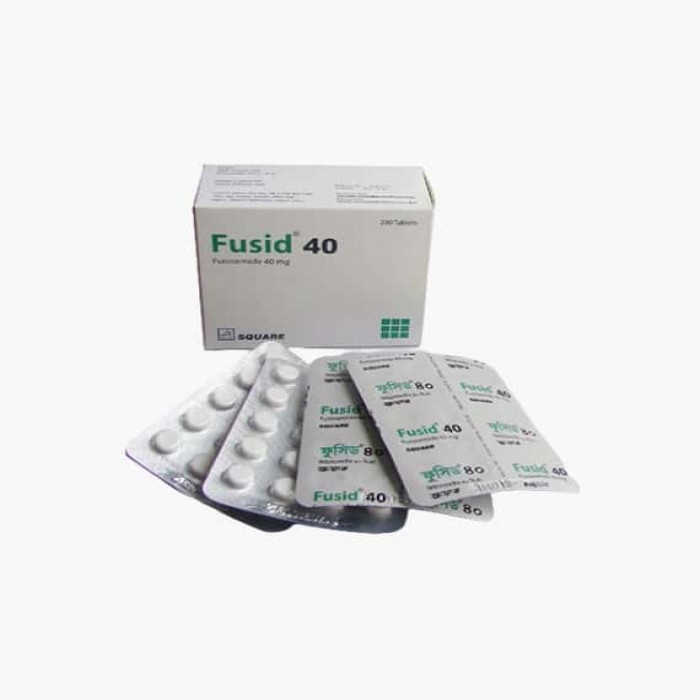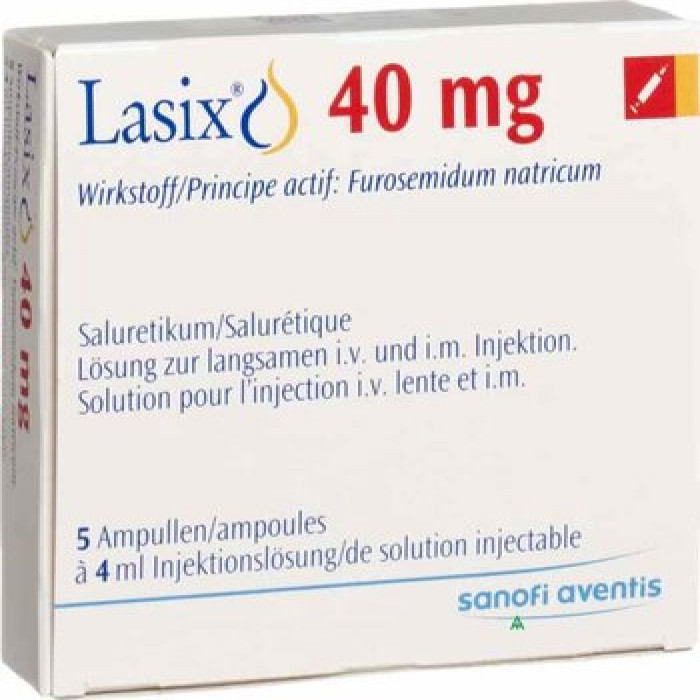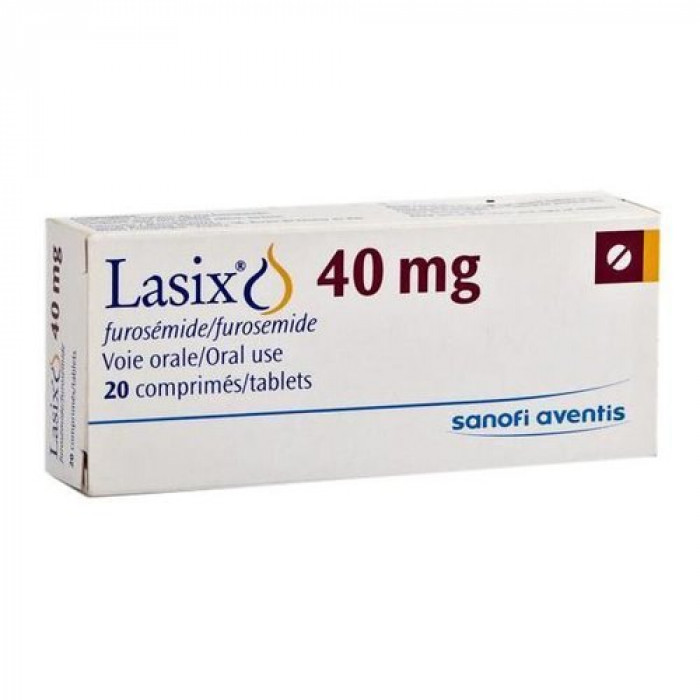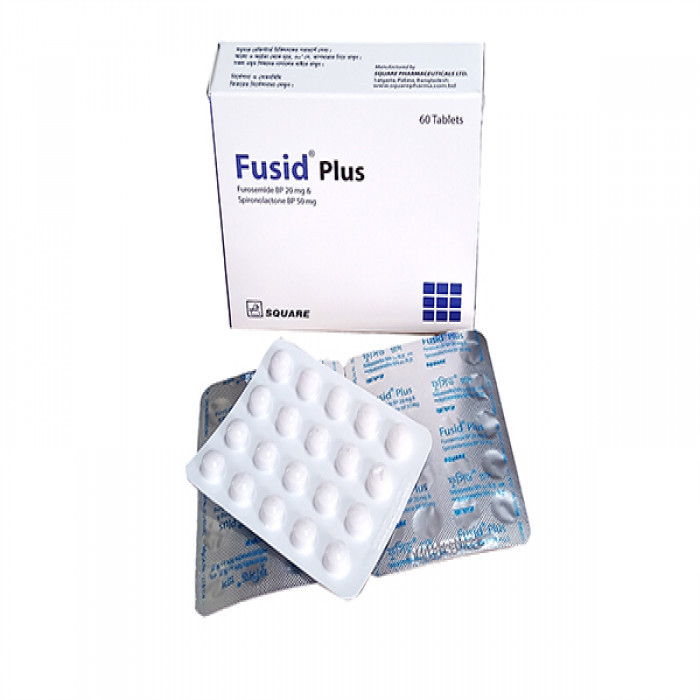
✔ 100% Authentic Product
👁️ Currently Viewing 6218
Furosemide, a diuretic medication, is contained in Fusid 40mg Tablet. It is used to alleviate edema throughout the body caused by heart disease, lung illness, liver disease, or kidney disease. It is also employed in the treatment of hypertension. It acts by lowering salt, chloride, and water absorption from the kidney, resulting in urine excretion. As a result, it lowers bodily edema by secreting more salt and water via urine, resulting in increased urination.
Discount
Price: ৳ 19
MRP:
৳
20
5%
Off

100% Genuine Products, Guaranteed

Safe & Secure Payments, Always

Fast, Secure & Efficient Delivery

Proper Packaging
 Cash on Delivery - All over Bangladesh
Cash on Delivery - All over Bangladesh Regular Delivery - 12-24 Hours, Dhaka City* Charge Tk.39-59
Regular Delivery - 12-24 Hours, Dhaka City* Charge Tk.39-59 Regular Delivery - 24-48 Hours, Other Cities* Charge Tk.99-110
Regular Delivery - 24-48 Hours, Other Cities* Charge Tk.99-110
🌙 রমযান অফার 🌙
 ফ্রি ডেলিভারিঃ - ৭৯৯ টাকা+ অর্ডারে, ঢাকা
শহরে
ফ্রি ডেলিভারিঃ - ৭৯৯ টাকা+ অর্ডারে, ঢাকা
শহরে ফ্রি ডেলিভারিঃ - ২৭৯৯ টাকা+ অর্ডারে, ঢাকার
বাহিরে
ফ্রি ডেলিভারিঃ - ২৭৯৯ টাকা+ অর্ডারে, ঢাকার
বাহিরে
📲 মোবাইল অ্যাপ অর্ডারে সাশ্রয় বেশী
-
Google Play Store থেকে ডাউনলোড
-
Apple Store থেকে ডাউনলোড
100% Genuine Products, Guaranteed
Safe & Secure Payments, Always
Fast, Secure & Efficient Delivery
Proper Packaging
 Cash on Delivery - All over Bangladesh
Cash on Delivery - All over Bangladesh Regular Delivery - 12-24 Hours, Dhaka City* Charge Tk.39-59
Regular Delivery - 12-24 Hours, Dhaka City* Charge Tk.39-59 Regular Delivery - 24-48 Hours, Other Cities* Charge Tk.99-110
Regular Delivery - 24-48 Hours, Other Cities* Charge Tk.99-110 ফ্রি ডেলিভারিঃ - ৭৯৯ টাকা+ অর্ডারে, ঢাকা
শহরে
ফ্রি ডেলিভারিঃ - ৭৯৯ টাকা+ অর্ডারে, ঢাকা
শহরে ফ্রি ডেলিভারিঃ - ২৭৯৯ টাকা+ অর্ডারে, ঢাকার
বাহিরে
ফ্রি ডেলিভারিঃ - ২৭৯৯ টাকা+ অর্ডারে, ঢাকার
বাহিরে- Google Play Store থেকে ডাউনলোড
- Apple Store থেকে ডাউনলোড
🌙 রমযান অফার 🌙
📲 মোবাইল অ্যাপ অর্ডারে সাশ্রয় বেশী
✅ Description:
Fusid 40mg Tablet contains frusemide (furosemide), which is classified as a diuretic medication. It is primarily prescribed to address edema (fluid retention) caused by various conditions such as heart, lung, kidney, or liver problems, as well as high blood pressure.
When excess fluid accumulates in the body, it can exert additional pressure on vital organs like the heart, blood vessels, lungs, kidneys, or liver, leading to symptoms like ankle swelling, difficulty breathing, or increased fatigue.
During the course of treatment with Fusid 40mg Tablet, your doctor may recommend regular blood tests to monitor your blood sugar and uric acid levels, as a precautionary measure to prevent any unwanted side effects. Additionally, they might closely monitor your blood potassium and sodium levels, especially if you experience vomiting or diarrhea.
Before starting this medication, it is important to inform your doctor about any existing kidney, liver, or heart conditions. Pregnant and breastfeeding women are advised against using Fusid 40mg Tablet. In children over 12 years of age, caution should be exercised when using this medication. Elderly patients should also use Fusid 40mg Tablet with caution.
The most commonly reported side effects of Fusid 40mg Tablet include dehydration, electrolyte imbalance, and decreased blood volume. If any of these side effects worsen or persist for an extended period, it is recommended to consult your doctor for further guidance
Safety Advices

Alcohol
UNSAFE
It is advised not to consume alcohol during the treatment with Fusid 40mg Tablet, as it may lower your blood pressure and may lead to side effects like dizziness or drowsiness.

Pregnancy
UNSAFE
Fusid 40mg Tablet is not recommended for use during pregnancy unless necessary. All the risks and benefits should be discussed with your doctor before taking this medicine.

Breastfeeding
UNSAFE
Fusid 40mg Tablet is not recommended for use while breastfeeding unless necessary. All the risks and benefits should be discussed with your doctor before taking this medicine.

Driving
CAUTION
Do not drive or operate any tools or machines if you experience drowsiness, dizziness, or blurred vision after taking Fusid 40mg Tablet.

Kidney
CONSULT YOUR DOCTOR
Fusid 40mg Tablet is to be taken with caution if you have a history of kidney diseases/conditions. Your doctor may adjust the dose depending on your condition.

Liver
CONSULT YOUR DOCTOR
Fusid 40mg Tablet to be taken with caution if you have a history of liver diseases/conditions. Your doctor may adjust the dose depending on your current liver conditions.
✔️ Uses of Fusid 40mg Tablet
- Treats Edema (Fluid Retention)
- Hypertension (high blood pressure)
✔️ How does Fusid 40mg Tablet work?
includes frusemide, a loop diuretic. It operates by decreasing sodium and chloride reabsorption in the proximal and distal tubules, as well as in the thick ascending loop of Henle, by blocking the sodium-chloride cotransport mechanism. As a result, it enhances diuresis (urine output) by increasing water excretion as well as sodium, chloride, magnesium, and calcium excretion.
✔️ Side Effects of Fusid 40mg Tablet
- Hearing impairment
- Headache
- Weakness
- Increased sensitivity of the skin to sunlight
- Muscle spasm
- Skin rash
- Dizziness
- Electrolyte imbalance
- Blurred vision
- Dehydration
- Increased urination frequency
- Low blood pressure
- Dehydration
- Decreased potassium level in the blood
- Decreased magnesium level in blood
- Decreased blood pressure
- Electrolyte imbalance
- The decreased sodium level in the blood
✔️ Quick Suggestions:
- Take the medication in the morning with breakfast to minimize the need to urinate at night.
- Monitor your blood pressure regularly after starting the medication, and inform your doctor if it does not show significant improvement.
- If you experience persistent dizziness, tiredness, or muscle weakness, consult your doctor for further evaluation.
- Maintain a healthy weight by aiming for a body mass index (BMI) between 19.5 and 24.9. This can help control your blood pressure.
- Engage in regular physical activity or exercise for at least 150 minutes per week, or approximately 30 minutes most days of the week. Regular exercise can contribute to lowering your elevated blood pressure by approximately 5 mm Hg.
- Adopt a balanced diet that includes whole grains, fruits, vegetables, and low-fat dairy products. This dietary approach promotes heart health and can assist in managing blood pressure.
- Limit your sodium intake by reducing the consumption of sodium chloride (table salt) to 2300 mg per day or ideally less than 1500 mg for most adults.
- If you consume alcohol, do so in moderation, with one serving per day for women and two servings per day for men being advisable.
- Quitting smoking is highly recommended as it significantly reduces the risk of heart disease and helps maintain healthier blood pressure levels.
- Manage stress effectively as chronic stress can contribute to elevated blood pressure. Engage in activities you enjoy, spend time with loved ones, and practice mindfulness techniques to cope with stress.
- Incorporate foods and drinks rich in heart-healthy omega-3 fatty acids into your diet. Additionally, opt for low-fat cooking oils like olive oil, soybean oil, canola oil, and coconut oil, as they can aid in lowering blood pressure.
- Potassium levels can be decreased and dehydration can occur due to Fusid 40mg Tablet. Consider taking potassium supplements or including potassium-rich foods such as bananas, spinach, and coconut water in your diet. However, consult your doctor before starting any supplements.
- Regular blood tests may be required to monitor your kidney function while taking Fusid 40mg Tablet. This helps ensure the medication is effectively managing your condition.
✔️ Indication
Furosemide is used to Treat-
- High blood pressure is treated with furosemide.
- Fluid retention and chronic congestive heart failure are related (if diuretic treatment is required).
- Fluid retention and acute congestive heart failure are related.
- Fluid retention is associated with chronic renal failure.
- Diuresis under duress is encouraged.
- In acute renal failure, especially those brought on by pregnancy or burns, fluid excretion is maintained.
- Retention of fluid is related to nephrotic syndrome (if diuretic treatment is required).
- Fluid retention is associated with liver damage (if necessary to supplement treatment with aldosterone antagonists).
- an urgent hypertension situation (as a supportive measure)
✔️ Pharmacology
Furosemide, a mono sulphonyl diuretic, is a potent diuretic that remains effective even at low glomerular filtration rates (GFR). Its impact on renal tubules is significant compared to other diuretic agents, particularly in terms of peak diuresis. Furosemide primarily functions by inhibiting the reabsorption of sodium and chloride in the thick ascending limb of the Henle loop. Its mechanism of action is independent of changes in acid-base balance.
Furosemide is highly bound to plasma proteins and is well absorbed from the gastrointestinal tract. It is rapidly eliminated from the body through urine. When administered intravenously, its effects can be observed within approximately 5 minutes and typically last for about 2 hours.
✔️ Dosage & Administration of Fusid 40mg Tablet
Administration:
Furosemide may be taken with or without food. Taking it with meals can help reduce gastrointestinal discomfort.
Adult Dose:
For resistant hypertension: The usual adult dose ranges from 20 to 80 mg taken orally divided into two doses every 12 hours.
For edema associated with congestive heart failure (CHF), liver cirrhosis, and renal disease (including nephrotic syndrome): The typical adult dose is 20 to 80 mg taken orally once daily. It may be increased by 20 to 40 mg every 6 to 8 hours, but the total daily dose should not exceed 600 mg. In elderly patients, the initial dose is usually 20 mg, which may be increased if necessary.
For edema associated with heart failure: The recommended adult dose is 20 to 40 mg administered intravenously or intramuscularly as a single dose. It may be increased by 20 mg every 2 hours, but the individual dose should not exceed 200 mg per dose. Refractory congestive heart failure may require higher doses.
For acute pulmonary edema, hypertensive crisis, and increased intracranial pressure: The typical adult dose is 0.5 to 1 mg/kg (or 40 mg) administered intravenously over 1-2 minutes. It may be increased to 80 mg if there is no adequate response within 1 hour, but the total dose should not exceed 160-200 mg per dose.
For hyperkalemia in Advanced Cardiac Life Support (ACLS): The recommended adult dose is 40-80 mg administered intravenously.
For hypermagnesemia in ACLS: The typical adult dose is 20-40 mg administered intravenously every 3-4 hours as needed.
In patients with hepatic impairment, close monitoring is necessary, particularly when using high dosages.
Child Dose:
For edema in infants and children: The initial dose is 1-2 mg/kg administered intravenously, intramuscularly, or orally. It may be increased by 1-2 mg/kg every 6-8 hours (for oral administration) or every 2 hours (for intravenous/intramuscular administration). The individual dose should not exceed 6 mg/kg.
For neonates (<28 days): The typical dose is 0.5-1 mg/kg administered intravenously or intramuscularly every 8-24 hours. The individual dose should not exceed 2 mg/kg.
For resistant hypertension in children 1-17 years old: The recommended dose is 0.5-2 mg/kg taken orally every 24 hours or every 12 hours. The individual dose should not exceed 6 mg/kg per dose.
Renal Dose:
In acute renal failure, a dose of 1-3 grams per day may be necessary to achieve the desired response. Furosemide should be avoided in oliguric states (states of low urine output).
✔️ Interaction
Fusid 40mg Tablet may interact with other medications used to lower blood pressure, such as metoprolol, ramipril, hydrochlorothiazide, and atorvastatin. These interactions can further lower blood pressure and potentially lead to severe conditions. It is important to discuss this with your doctor if you are taking any of these medications.
Fusid 40mg Tablet also interacts with medications used to treat erectile dysfunction (e.g., sildenafil), anti-epilepsy medicines (e.g., carbamazepine, phenobarbital), certain painkillers (e.g., ibuprofen, aspirin), medications used to treat irregular heartbeats (e.g., sotalol), and immune-suppressing drugs (e.g., cyclosporine). If you are taking any of these medications, it is important to inform your doctor to avoid potential interactions.
There are also specific drug-disease interactions to be aware of. Fusid 40mg Tablet should not be given to individuals with cardiogenic shock (when the heart fails to pump required blood to the body), heart valve problems (stenosis), low blood pressure (hypotension), coronary heart disease, liver disease, heart failure, low serum potassium levels (hypokalemia), or patients with no urine output (anuria). If you have any of these conditions, it is important to discuss them with your doctor before taking Fusid 40mg Tablet.
✔️ Contraindications
Severe sodium and water depletion: Fusid 40mg Tablet should not be used in individuals with severe depletion of sodium and water levels in the body.
Hypersensitivity to sulphonamides and furosemide: If you have a known hypersensitivity or allergic reaction to sulphonamides (a class of antibiotics) or furosemide, Fusid 40mg Tablet should be avoided.
Hypokalaemia: Fusid 40mg Tablet is contraindicated in individuals with low levels of potassium in the blood, known as hypokalaemia.
Hyponatraemia: Fusid 40mg Tablet should not be used in individuals with low levels of sodium in the blood, known as hyponatremia.
Precomatose states associated with liver cirrhosis: If you are in a precomatose state due to liver cirrhosis, Fusid 40mg Tablet should not be used.
Anuria or renal failure: Fusid 40mg Tablets is contraindicated in individuals who have anuria (no urine output) or renal failure (kidney failure).
Addison's disease: Fusid 40mg Tablet should not be used in individuals with Addison's disease, which is a disorder of the adrenal glands.
✔️ Pregnancy & Lactation
Furosemide is classified as Pregnancy Category C, meaning that its use during pregnancy may require monitoring of fetal growth due to the potential risk of higher birth weights in babies.
In terms of lactation, furosemide is excreted into breast milk. Therefore, caution should be exercised when using furosemide while breastfeeding. It is important to note that furosemide may inhibit lactation, so careful consideration should be given to the potential impact on breastfeeding before using this medication.
✔️ Precautions & Warnings
Fusid 40mg Tablet should not be given to individuals who are allergic to Fusid 40mg Tablet. It is also contraindicated in individuals with low blood pressure (less than 90 mmHg), a history of heart attack, kidney disease, or liver disease. Pregnant women and those planning to become pregnant should not take Fusid 40mg Tablet. It is also contraindicated in breastfeeding women, as Fusid 40mg Tablet can pass into breast milk, although its effect on the baby is unknown. It is important to inform your doctor if you are taking Fusid 40mg Tablet and breastfeeding.
In addition to the contraindications mentioned above, Fusid 40mg Tablet should not be used in individuals with low blood pressure (hypotension), cardiogenic shock (sudden stopping of blood flow to the heart), or aortic stenosis (a heart valve problem).
It is crucial to consult with your doctor and provide a complete medical history before taking Fusid 40mg Tablet to ensure it is safe and appropriate for your condition.
✔️ Storage Conditions
- Store Fusid 40mg Tablet at a temperature below 25°C in a cool and dry place.
- Keep it out of the reach of children and pets.
⚠️Disclaimer:
At ePharma, we’re committed to providing accurate and accessible health information. However, all content is intended for informational purposes only and should not replace medical advice from a qualified physician. Please consult your healthcare provider for personalized guidance. We aim to support, not substitute, the doctor-patient relationship.










